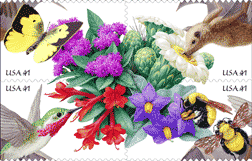|
|
 |
||||||||||
|
|||||||||||
|
|||||||||||
Catch the BuzzFace your fears for pollination’s sakeby M.L. Faunce
Some people have a natural fear of bees and their flying cousins: wasps, hornets, yellow jackets, you name it. So did I after being stung while cleaning salmon in Alaska after a successful day of fishing. Instead of roasting shiny silvery sockeye over an alder fire, I was transported to a hospital in the nearest town; at least there was a town. After that, I took precautions. I didn’t wear the color red out of doors, never wore perfume and constantly looked over my shoulder when hiking, even when larger threats like bears more likely loomed. The slightest buzzzz would set my adrenaline racing. Most of us will never be a bee charmer like Idgie Threadgoode in Fried Green Tomatoes. Still, psychologists tell us to face the things we fear. Finally, I got tired of worrying about stinging insects, though each summer I carry an Epi-pen for insurance. When I learned about how vital these insects are to life itself, my fears took another turn. Pollinators — not only bees and luminous hummingbirds but also flies, beetles, butterflies, moths, ants, bats and small mammals — are critical to our ecosystem. There are more than 2,000 animal pollinators, but some species of honeybees, birds, bats and butterflies are endangered. June 24 to 30 has been named National Pollinator Week by the U.S. Department of Agriculture and the United States Senate (maybe the rare non-political action this body has taken in recent memory). While some politicians may have scoffed at Global warming, they have gotten behind pollinators. So this is a good week to begin learning more about these beneficial pollinators that help bring us the foods we adore: blueberries, peaches, melons, chocolate, coffee, almonds and so much more. Without pollinators, our plants wouldn’t propagate. “Nearly 80 percent of our world’s crop plants require pollination,” reports the Pollinator Partnership. “Without pollination, humans and ecosystems cannot survive.” Because of land development, pollution and pesticide poisoning, “we are losing pollinators around the world at an alarming rate.” On June 29, the U.S. Postal Service issues its colorful Pollinator series, a four design, 20-stamp booklet depicting flowers and pollinators arranged in two alternate blocks fitting together like interlocking puzzles. “The only thing we have to fear is fear itself,” Franklin Delano Roosevelt said in his first inaugural address in 1933. Now we can put that notion in motion. Be bold, be brave: Face your fears at Pollinator Week events: • Sat., June 30: The Maryland Cooperative Extension Service holds an outdoor Pollinator Week celebration, Our World Survives Because of Pollinators. 10am-3pm @ Salisbury Zoo, Salisbury. Ginny Rosenkrantz: 410-749-6141. • Sat., June 30: Celebrate Pollinator Week at Woodlawn with a workshop and outdoor activities for families by the Wildlife Habitat Council. 11am-3pm @ New Beginnings Woodlawn Wildlife Area, Cecil County. Jeff Popp: 301-588-8994. Closer to home, you can help pollinators proliferate in your back yard: Use native plants in your yard and garden, reduce or eliminate pesticides, supply pollinators with nectar, pollen and welcoming habitat. For ideas, visit the National Zoo’s new garden exhibit, The Zoo in Your Backyard near the Connecticut Avenue entrance. Begin your journey at The Pollinator Partnership’s website sponsored by the National American Pollinator Protection Campaign: www.pollinator.org/. |
|||||||||||
|
|||||||||||
|
© COPYRIGHT 2007 by New Bay Enterprises, Inc. All rights reserved. |
|||||||||||
